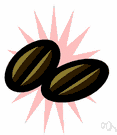caffeine
Also found in: Thesaurus, Medical, Acronyms, Encyclopedia, Wikipedia.
caf·feine
also caf·fein (kă-fēn′, kăf′ēn′)n.
A bitter white alkaloid, C8H10N4O2, found in certain plants such as cacao, coffee, kola, and tea, that stimulates the central nervous system and body metabolism and is used in medicine, usually in combination with other drugs, to relieve headaches and treat respiratory conditions in premature infants.
[German Kaffein (from Kaffee, coffee) or French caféine, both from French café, coffee; see café.]
American Heritage® Dictionary of the English Language, Fifth Edition. Copyright © 2016 by Houghton Mifflin Harcourt Publishing Company. Published by Houghton Mifflin Harcourt Publishing Company. All rights reserved.
caffeine
(ˈkæfiːn; ˈkæfɪˌiːn) orcaffein
n
(Elements & Compounds) a white crystalline bitter alkaloid responsible for the stimulant action of tea, coffee, and cocoa: a constituent of many tonics and analgesics. Formula: C8H10N4O2. See also xanthine2
[C19: from German Kaffein, from Kaffee coffee]
Collins English Dictionary – Complete and Unabridged, 12th Edition 2014 © HarperCollins Publishers 1991, 1994, 1998, 2000, 2003, 2006, 2007, 2009, 2011, 2014
caf•feine
(kæˈfin, ˈkæf in)n.
a white, crystalline, bitter alkaloid, C8H10N4O2, usu. derived from coffee or tea, used medicinally as a stimulant.
caf•fein•ic (kæˈfi nɪk, ˌkæf iˈɪn ɪk) adj.
Random House Kernerman Webster's College Dictionary, © 2010 K Dictionaries Ltd. Copyright 2005, 1997, 1991 by Random House, Inc. All rights reserved.
caf·feine
(kă-fēn′) A bitter white alkaloid found in tea, coffee, and various plants. It is a mild stimulant.
The American Heritage® Student Science Dictionary, Second Edition. Copyright © 2014 by Houghton Mifflin Harcourt Publishing Company. Published by Houghton Mifflin Harcourt Publishing Company. All rights reserved.
ThesaurusAntonymsRelated WordsSynonymsLegend:
Switch to new thesaurus
| Noun | 1. |  caffeine - a bitter alkaloid found in coffee and tea that is responsible for their stimulating effects caffeine - a bitter alkaloid found in coffee and tea that is responsible for their stimulating effectscoffee, java - a beverage consisting of an infusion of ground coffee beans; "he ordered a cup of coffee" tea - a beverage made by steeping tea leaves in water; "iced tea is a cooling drink" alkaloid - natural bases containing nitrogen found in plants |
Based on WordNet 3.0, Farlex clipart collection. © 2003-2012 Princeton University, Farlex Inc.
Translations
كَافِيـنمادَّة الكافئين في القهوه والشاي
kofein
koffein
kofeiini
kofein
koffein
kaffín
カフェイン
카페인
kofeinas
kofeīns
kofeín
koffein
สารคาเฟอีน
cafêin
Collins English/French Electronic Resource. © HarperCollins Publishers 2005
Collins Italian Dictionary 1st Edition © HarperCollins Publishers 1995
caffeine
(ˈkӕfiːn) , ((American) kӕˈfi:n) noun a drug found in coffee and tea.
Kernerman English Multilingual Dictionary © 2006-2013 K Dictionaries Ltd.
caffeine
→ كَافِيـن kofein koffein Koffein καφεΐνη cafeína kofeiini caféine kofein caffeina カフェイン 카페인 cafeïne koffein kofeina cafeína кофеин koffein สารคาเฟอีน kafein cafêin 咖啡因Multilingual Translator © HarperCollins Publishers 2009
caf·feine
n. cafeína, alcaloide presente esp. en el café y el té, estimulante y diurético.
English-Spanish Medical Dictionary © Farlex 2012
caffeine
n cafeínaEnglish-Spanish/Spanish-English Medical Dictionary Copyright © 2006 by The McGraw-Hill Companies, Inc. All rights reserved.